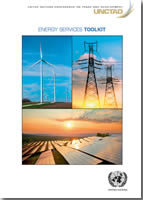
The energy industry - particularly the electricity industry - is central to the prosperity of economies and to social welfare. The availability of electric supply is essential for both economic development and quality of life. It is also a critical requirement for human development.
By its very nature, the energy services industry in general and the electricity industry in particular is capital intensive, technologically sophisticated, and, in developing countries as well as in many developed ones, highly dependent on foreign trade, services, and investment.
That dependence derives from, among other things, lack of sufficient domestic capital, lack of trained personnel, and the fact that manufacturing of needed technology and fuel is often located outside the national boundaries of most developing countries. Thus, the development of the electricity industry, whose purpose is focused on domestic needs, is inextricably linked to the global flow of capital, equipment, fuels, and services.
The result is that the regulatory regime designed to meet the requirements of the domestic market is inevitably compelled to interface with international trade and the rules surrounding it.
This paper examines three levels of regulatory activity with respect to electricity services and assesses how each might interface with applicable trade rules and agreements.

The emphasis in this paper is on Level 1: Regulation that is an inherent and necessary part of the oversight of power services, as is most essential to regulation of the energy services and the area where potential conflicts between trade and regulatory considerations can be most consequential.
The paper begins by discussing the current international legal framework as it applies to the intersection of energy services regulation and international trade, examining the most relevant current provisions and some of the emerging trends in international trade regulation.
The objective of the discussion is to draw policy implications for developing countries on how to harvest development gains from the regulatory frameworks in the context of a changing trade environment. To do that, there is a three-part discussion of the intersection of potential regulatory and trade issues, focusing first (and primarily) on those most essential to the regulatory enterprise, and then turning to discussions of issues less central to regulation (though potentially important to public policy).
The “Final Remarks” section highlights some of the key issues identified in the paper.



